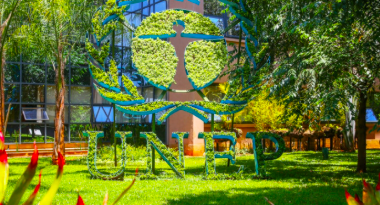
unep headquaters/File
The Global Framework on Chemicals (GFC) Fund has launched
its second call for project proposals, inviting countries to develop innovative
solutions that curb the harm caused by hazardous chemicals and waste.
Targeting developing nations and those with economies in transition, the fund offers grants ranging from $300,000 (Sh38.7 million) to $800,000 (Sh103.3 million) for projects lasting up to three years. The financing aims to help countries strengthen chemical laws, improve safety systems and promote safer alternatives where such support is most urgently needed.
Kay Williams, Head of the Unep-hosted GFC Secretariat, described the fund as a key driver of global action.
“We’re eager to support bold, collaborative proposals that turn the framework’s commitments into measurable action on the ground,” she said.
Managed by the UN Environment Programme (Unep), the fund is a cornerstone of the Global Framework on Chemicals, which was adopted in 2023 to ensure the safe and sustainable management of chemicals and waste across all sectors.
It supports medium-scale projects that enhance regulatory and technical capacity, foster cross-sector collaboration and promote practical solutions throughout the chemicals value chain.
Several governments and organisations including Germany, the Netherlands, Spain, Switzerland, the United Kingdom, the United States, Belgium, Finland, the European Commission and the International Council of Chemical Associations back the fund. Their contributions have already begun driving progress globally.
The fund’s first call attracted 105 proposals from 77 countries, demonstrating strong global demand for implementation support. Earlier this year, four regional projects — benefiting 11 countries in Africa and Latin America — were approved, with agreements being finalised for rollout before the end of 2025.
These initiatives include efforts to strengthen industrial chemical legislation in Colombia and Peru, advance Globally Harmonized System labelling in El Salvador and Honduras, and replace highly hazardous pesticides with agroecological alternatives in parts of West and East Africa.
The second round introduces a two-stage application process. Applicants will first submit short concept notes, after which shortlisted candidates will be invited to present full proposals — with feedback to help refine their submissions. Civil society applicants are required to include national government endorsements.
This new call also places stronger emphasis on long-term sustainability, multisectoral partnerships — particularly with the health and labour sectors — and on projects that can scale or be replicated for broader impact.
















